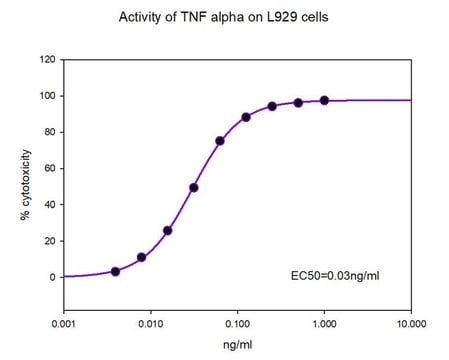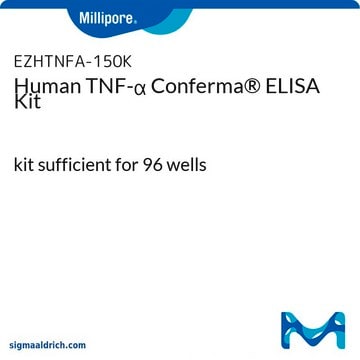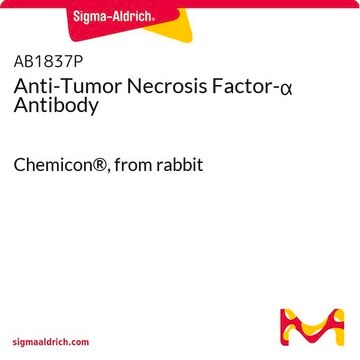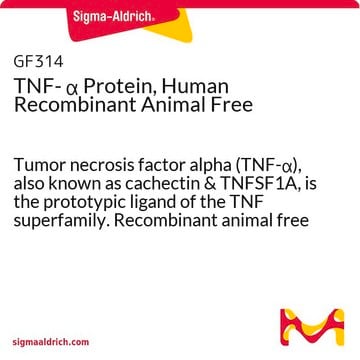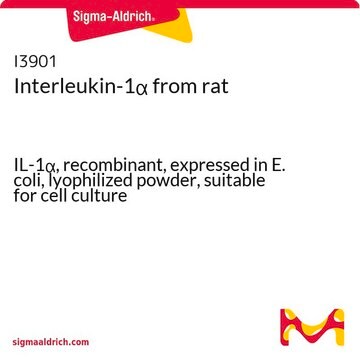11088939001
Roche
Tumor Necrosis Factor-α, human (hTNF-α)
recombinant (yeast)
Sinónimos:
hTNF, human necrosis factor
Iniciar sesiónpara Ver la Fijación de precios por contrato y de la organización
About This Item
UNSPSC Code:
12352207
Productos recomendados
biological source
human
Quality Level
recombinant
expressed in yeast
assay
≥95% (SDS-PAGE)
form
solution
potency
≤0.01 ng/mL EC50
specific activity
>1*10^8 U/mg
mol wt
17,000 Da
packaging
pkg of 1,000,000 U (10 μg, 1ml)
manufacturer/tradename
Roche
storage condition
avoid repeated freeze/thaw cycles
impurities
<0.1 EU/μgtested (LAL test)
UniProt accession no.
storage temp.
−20°C
Gene Information
human ... TNF(7124)
General description
>1 x 10⊥8 U/mg, <0.01 ng/ml (hTNF-a, NIBSC, interim standard, 87/650), at least the same specific activity (EC50) compared to the indicated standard is guaranteed.
Specificity
Human hTNF-α is effective on human and mouse cells.
Species specificity: human, mouse
Application
Tumor Necrosis Factor-α (hTNF-α)
- Shows cytolytic and/or cytostatic activity on a variety of transformed cell lines.
- Has activating and growth stimulating activities on a variety of normal cells.
- Has antiviral activity on many cell types in vitro.
- Can cause tumor necrosis of certain tumors in vivo.
Biochem/physiol Actions
Receptor p55 and p75, belonging to the TNFR gene family, mediate the biological activity of TNF-a, and are co-expressed on the surface of various cell types. The pleiotropic action of TNF-a is initiated by binding to either of the two receptors.
Quality
Purity: >95% (SDS-PAGE)
Endotoxin level: <0.1 EU/μg (LAL-test), <10 EU/ml (LAL-test)
Endotoxin level: <0.1 EU/μg (LAL-test), <10 EU/ml (LAL-test)
Sequence
Chain Length 157 AA
One polypeptide chain (157 amino acids), identical to natural hTNF-α.
Unit Definition
EC50 definition: The amount of hTNF-α that is required to mediate half-maximal cytotoxicity (MTT cleavage) with WEHI 164 cells in the presence of actinomycin D (1 unit equals ≤0.01 ng/ml).
Physical form
Solution, filtered through 0.2 μm pore size membrane.
Preparation Note
Working concentration: 1 ng/ml
For complete cell lysis of sensitive cell lines about 1 ng/ml is recommended.
Working solution: Dilute the concentrated hTNF-α solution (10 μg/ml) with PBS or culture medium containing BSA (or HSA), 1 mg/ml (0.1%) or serum 1 to 10%.
Storage conditions (working solution): -15 to -25 °C
It is recommended to store the solution in aliquots at -15 to -25 °C.
Note: Avoid repeated freezing and thawing.
For complete cell lysis of sensitive cell lines about 1 ng/ml is recommended.
Working solution: Dilute the concentrated hTNF-α solution (10 μg/ml) with PBS or culture medium containing BSA (or HSA), 1 mg/ml (0.1%) or serum 1 to 10%.
Storage conditions (working solution): -15 to -25 °C
It is recommended to store the solution in aliquots at -15 to -25 °C.
Note: Avoid repeated freezing and thawing.
Other Notes
For life science research only. Not for use in diagnostic procedures. 1 EU corresponds to 0.1 ng
Storage Class
12 - Non Combustible Liquids
wgk_germany
nwg
flash_point_f
does not flash
flash_point_c
does not flash
Elija entre una de las versiones más recientes:
¿Ya tiene este producto?
Encuentre la documentación para los productos que ha comprado recientemente en la Biblioteca de documentos.
P De Cesaris et al.
The Journal of biological chemistry, 274(41), 28978-28982 (1999-10-03)
Tumor necrosis factor alpha (TNF-alpha) is a cytokine implicated in the pathogenesis of numerous chronic and acute inflammatory conditions. We have previously shown that mouse Sertoli cells respond to TNF-alpha by increasing interleukin-6 production and intercellular adhesion molecule-1 (ICAM-1) expression
Rajitha Indukuri et al.
Frontiers in endocrinology, 12, 650625-650625 (2021-04-17)
Inflammation is a primary component of both initiation and promotion of colorectal cancer (CRC). Cytokines secreted by macrophages, including tumor necrosis factor alpha (TNFα), activates the pro-survival transcription factor complex NFκB. The precise mechanism of NFκB in CRC is not
Nuestro equipo de científicos tiene experiencia en todas las áreas de investigación: Ciencias de la vida, Ciencia de los materiales, Síntesis química, Cromatografía, Analítica y muchas otras.
Póngase en contacto con el Servicio técnico
